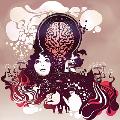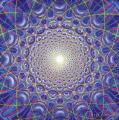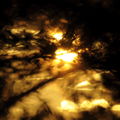
DMT-Nexus member

Posts: 14191 Joined: 19-Feb-2008 Last visit: 22-Nov-2025 Location: Jungle
|
So I was going through this paper on receptor binding profile of different psychoactive substances and it called my attention that it says mescaline has no binding to 5-HT2a receptor (check this supplementary data for example) That seems to go against the commonly held affirmation that mescaline is a 5-HT2a agonist, for example as claimed here. But this paper uses as a reference for example Nichols article which only talks about the belief that hallucinogens have their effect because of 5-HT2a, and includes a chapter on mescaline without actually mentioning any specific paper that shows that receptor binding. Or this paper has evidence for 5-HT2a activity of some mescaline analogues but not mescaline itself. Or this paper that again claims mescaline´s action on 5-HT2a but doesn´t seem to quote any particular paper that shows that receptor binding of specifically 5-HT2a and mescaline? At the same time, this paper uses a 5HT2a antagonist which does seem to affect some mescaline effect (in rats) but I´m not sure how selective this substance is to this particular receptor (I can´t find the full paper either and whether that type of rat response is necessarily evidence for the 5-HT2a relevance in mescaline´s psychoactive effects? Can anyone find another paper which specifically shows mescaline receptor binding to 5-HT2a ? And if not, isn´t it strange that the receptorome paper that inspired this thread didn´t find any mescaline 5-HT2a agonism, and no discussion on this curious fact seems to be held anywhere?
|
|
|
|
|

DMT-Nexus member

Posts: 3090 Joined: 09-Jul-2016 Last visit: 03-Feb-2024
|
Wow. That is an interesting paper. I just glanced over it quickly, but i've never seen such an aproach, leading up to that ranking of "psychedelically relevant" receptors, before. That is just realy cool.
I think most people in the field of psychedelic research already agreed that 5ht2a is not the only important receptor and that there is a whole cluster of receptors that classic hallucinogens act on.
I'm going to sleep now, but i'm thinking of making a sort of "neural network" kind of diagram, based on that first article: connecting substances to receptors to see if that would lead to nice visually identifiable clusters of substances, and then checking if those clusters would match our experiences with those substances.
If i'll manage to produce something that is visually as clear as a subway map i'll upload it.
|
|
|

DMT-Nexus member
Posts: 274 Joined: 28-Sep-2019 Last visit: 10-Apr-2025
|
Most of the studies I've seen on the pharmacodynamics of psychedelics like DMT, LSD, 2CB, psilocin, and mescaline have always differed in some way shape or form regarding receptor binding profile and the mechanism of action of each compound. But I have noticed some studies stating phenethylamines such as 2cb showing a higher binding preference towards the 5-HT2C receptor where it functions as a partial agonist, relative to the 5-HT2A receptor where it shows little to no activity as a partial agonist, but instead functioning as a antagonist [1]. That being said, its still well known that compounds with strong partial agonist action towards the 5-HT2A receptor like LSD will induce cross-tolerance with psychedelics like mescaline, and the action of mescaline is still blocked out by 5-HT2A antagonists like methysergide and haloperidol, as well as a number of antipsychotic drugs [2]. Therefore I don't think it would be fair to say that the 5-HT2A receptor doesn't play a role in the effect of mescaline. It's pretty hard to find studies with compounds which only block the 5-HT2A receptor (or 5-HT2C), the aforementioned migraine and antipsychotic drugs target the 5-HT2C receptor the same way they do the 5-HT2A receptor, so its hard to pinpoint just how mescaline's action is being blocked in the second study and therefor which receptor its working on more so than the other. With this all in mind I think it wouldn't be out of order to say that the 5-HT2C receptor is just as involved in eliciting psychedelia as the 5-HT2A receptor. Perhaps mescaline works in a similar fashion to phenethylamines such as 2CB with preferential targeting of the 5-HT2C receptor opposed to the 5-HT2A receptor? P.S. I'm really sleep deprived and burnt out from unhealthy habits so I'm not sure how well I answered endless's question here (if at all) but either way I really look forward on the responses on the action of mescaline at the 5-HT2A receptor sight. References: [1] - https://www.ncbi.nlm.nih...c/articles/PMC4620274/#:~:text=2C%2DB%20(Nexus)%20is,entactogen%2C%20and%2For%20empathogen. [2] - https://www.ncbi.nlm.nih...pmc/articles/PMC6864602/[Extra] - David E Nichols pharmacology Youtube link - https://youtu.be/LbUGRcuA16E?t=250
|
|
|

DMT-Nexus member

Posts: 3090 Joined: 09-Jul-2016 Last visit: 03-Feb-2024
|
King Tryptamine wrote:Most of the studies I've seen on the pharmacodynamics of psychedelics like DMT, LSD, 2CB, psilocin, and mescaline have always differed in some way shape or form regarding receptor binding profile and the mechanism of action of each compound. But I have noticed some studies stating phenethylamines such as 2cb showing a higher binding preference towards the 5-HT2C receptor where it functions as a partial agonist, relative to the 5-HT2A receptor where it shows little to no activity as a partial agonist, but instead functioning as a antagonist [1]. That being said, its still well known that compounds with strong partial agonist action towards the 5-HT2A receptor like LSD will induce cross-tolerance with psychedelics like mescaline, and the action of mescaline is still blocked out by 5-HT2A antagonists like methysergide and haloperidol, as well as a number of antipsychotic drugs [2]. Therefore I don't think it would be fair to say that the 5-HT2A receptor doesn't play a role in the effect of mescaline. It's pretty hard to find studies with compounds which only block the 5-HT2A receptor (or 5-HT2C), the aforementioned migraine and antipsychotic drugs target the 5-HT2C receptor the same way they do the 5-HT2A receptor, so its hard to pinpoint just how mescaline's action is being blocked in the second study and therefor which receptor its working on more so than the other. With this all in mind I think it wouldn't be out of order to say that the 5-HT2C receptor is just as involved in eliciting psychedelia as the 5-HT2A receptor. Perhaps mescaline works in a similar fashion to phenethylamines such as 2CB with preferential targeting of the 5-HT2C receptor opposed to the 5-HT2A receptor? P.S. I'm really sleep deprived and burnt out from unhealthy habits so I'm not sure how well I answered endless's question here (if at all) but either way I really look forward on the responses on the action of mescaline at the 5-HT2A receptor sight. References: [1] - https://www.ncbi.nlm.nih...c/articles/PMC4620274/#:~:text=2C%2DB%20(Nexus)%20is,entactogen%2C%20and%2For%20empathogen. [2] - https://www.ncbi.nlm.nih...pmc/articles/PMC6864602/[Extra] - David E Nichols pharmacology Youtube link - https://youtu.be/LbUGRcuA16E?t=250 Well the thing is that the study also says that mescaline is not active on 5-ht2c. The cross tolerance could still come from the other receptors mentioned, probably. It is then still hard to explain how 5-ht2a antagonism can block the effects of mescaline, if methysegide and haloperidol aren't also antagonists of 5-ht2b or other receptors. You could maybe speculate that all the 5-ht2 receptors have a simmilar function, and that blocking one of them, triggers the same mechanisms like upregulation, for all of them.
|
|
|

DMT-Nexus member

Posts: 3090 Joined: 09-Jul-2016 Last visit: 03-Feb-2024
|
dragonrider wrote:Wow. That is an interesting paper. I just glanced over it quickly, but i've never seen such an aproach, leading up to that ranking of "psychedelically relevant" receptors, before. That is just realy cool.
I think most people in the field of psychedelic research already agreed that 5ht2a is not the only important receptor and that there is a whole cluster of receptors that classic hallucinogens act on.
I'm going to sleep now, but i'm thinking of making a sort of "neural network" kind of diagram, based on that first article: connecting substances to receptors to see if that would lead to nice visually identifiable clusters of substances, and then checking if those clusters would match our experiences with those substances.
If i'll manage to produce something that is visually as clear as a subway map i'll upload it. OK, i just made a first sketch on paper, and it is clear to me that this is not going to be an easy thing. To realy make this work, i think using a computer to do work this out properly is going to be a nessecary step. But anyway, this is the first draft on paper.  You can see that just visualizing the effects of just 5 substances already creates an almost intangible maze of lines. The thickness of the lines indicates the relative importance of the receptor. Now the thing with computer graphics is that you could make them interactive. So make the network of a particular substance light up when you click on it, or making all connections to a certain receptor light up if you click on it, would make it a lot better. Thing is, i don't know how to do that so i'm gonna have to learn how to use some graphic program first, but that's OK. It will just all take a little more time. dragonrider attached the following image(s):  IMG_20230119_154736_1.jpg (7,376kb) downloaded 73 time(s).
|
|
|

Boundary condition

Posts: 8617 Joined: 30-Aug-2008 Last visit: 24-Dec-2025 Location: square root of minus one
|
Nice sketch, dragonrider. I'm tempted to have a try with rendering it in a graphics program myself - if that's OK with you? I could also ask a graphic designer friend of mine to polish it up if you wanted a really nice version... “There is a way of manipulating matter and energy so as to produce what modern scientists call 'a field of force'. The field acts on the observer and puts him in a privileged position vis-à-vis the universe. From this position he has access to the realities which are ordinarily hidden from us by time and space, matter and energy. This is what we call the Great Work." ― Jacques Bergier, quoting Fulcanelli
|
|
|

DMT-Nexus member

Posts: 3090 Joined: 09-Jul-2016 Last visit: 03-Feb-2024
|
downwardsfromzero wrote:Nice sketch, dragonrider.
I'm tempted to have a try with rendering it in a graphics program myself - if that's OK with you?
I could also ask a graphic designer friend of mine to polish it up if you wanted a really nice version... Actually, yes. I only started this because i thought it could be usefull to this site. But after this draft it became clear to me that doing this without a computer is crazy. Especially because with a computer you could add that element of interactivity. It would also be easier to put tryptamines with tryptamines, and phens together in another group as well. And LSD somewhere in between. I have no experience with graphic design at all, so...yes that would be great. Edit: with yes i meant ofcourse: yes, i would absolutely like you to do that. I am most of all curious what the end result would look like.
|
|
|

Boundary condition

Posts: 8617 Joined: 30-Aug-2008 Last visit: 24-Dec-2025 Location: square root of minus one
|
Well, interactivity is a whole other level. How far do you imagine taking that at the moment? Are there any similar tools already in existence? What do you envisage as the most important components of the interactivity? My level of engagement would at present be confined to sprucing up your sketch so the lines look less tangled, but I may be able to do something a bit more fancy around the beginning of summer. I'll also canvass a couple of contacts in the meantime. “There is a way of manipulating matter and energy so as to produce what modern scientists call 'a field of force'. The field acts on the observer and puts him in a privileged position vis-à-vis the universe. From this position he has access to the realities which are ordinarily hidden from us by time and space, matter and energy. This is what we call the Great Work." ― Jacques Bergier, quoting Fulcanelli
|
|
|

DMT-Nexus member
Posts: 373 Joined: 22-Dec-2019 Last visit: 09-Feb-2024
|
That would be nice! Might be inspired by this: Exploring the ebbs and flows of different agricultural movements The substances on top, selectable. Then the receptors, bindings and perhaps even their effects on the body/mind.
|
|
|

DMT-Nexus member

Posts: 3090 Joined: 09-Jul-2016 Last visit: 03-Feb-2024
|
I have no experience with using prezi myself, but i've seen some cool presentations made with that tool. Maybe we could use prezi to do this. The great benefit, if it would indeed be possible to do this with prezi, would be that i could just create an account and share it with all nexians who would want to help. That way we could share the burden.
|
|
|
DMT-Nexus member
Posts: 48 Joined: 26-Apr-2022 Last visit: 08-Feb-2024 Location: Pennsylvania
|
Do you have the data pertaining to which psychedelics affect which serotonin receptors? Then the data pertaining to how those serotonin receptors affect various dopamine neurotransmitters? If so, I'm sure I could code something up fairly quickly using python/plotly, but I don't see how this cold be done otherwise
|